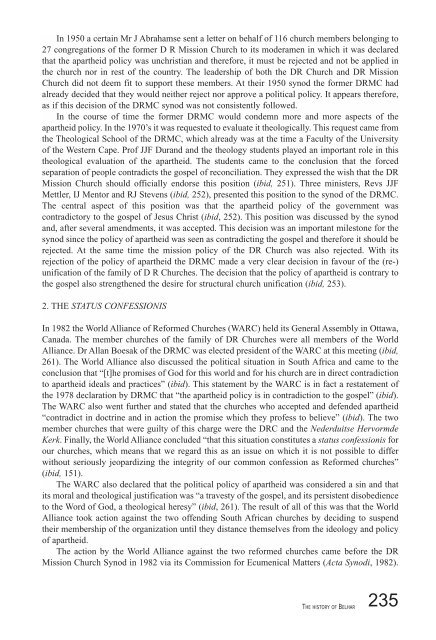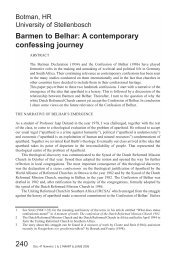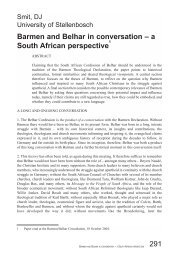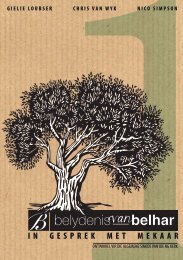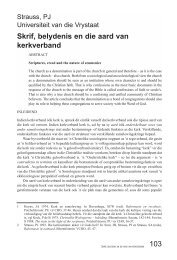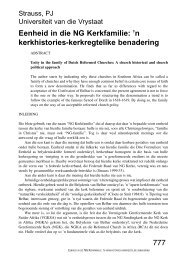The history of Belhar - Belydenis van Belhar
The history of Belhar - Belydenis van Belhar
The history of Belhar - Belydenis van Belhar
You also want an ePaper? Increase the reach of your titles
YUMPU automatically turns print PDFs into web optimized ePapers that Google loves.
In 1950 a certain Mr J Abrahamse sent a letter on behalf <strong>of</strong> 116 church members belonging to27 congregations <strong>of</strong> the former D R Mission Church to its moderamen in which it was declaredthat the apartheid policy was unchristian and therefore, it must be rejected and not be applied inthe church nor in rest <strong>of</strong> the country. <strong>The</strong> leadership <strong>of</strong> both the DR Church and DR MissionChurch did not deem fit to support these members. At their 1950 synod the former DRMC hadalready decided that they would neither reject nor approve a political policy. It appears therefore,as if this decision <strong>of</strong> the DRMC synod was not consistently followed.In the course <strong>of</strong> time the former DRMC would condemn more and more aspects <strong>of</strong> theapartheid policy. In the 1970’s it was requested to evaluate it theologically. This request came fromthe <strong>The</strong>ological School <strong>of</strong> the DRMC, which already was at the time a Faculty <strong>of</strong> the University<strong>of</strong> the Western Cape. Pr<strong>of</strong> JJF Durand and the theology students played an important role in thistheological evaluation <strong>of</strong> the apartheid. <strong>The</strong> students came to the conclusion that the forcedseparation <strong>of</strong> people contradicts the gospel <strong>of</strong> reconciliation. <strong>The</strong>y expressed the wish that the DRMission Church should <strong>of</strong>ficially endorse this position (ibid, 251). Three ministers, Revs JJFMettler, IJ Mentor and RJ Stevens (ibid, 252), presented this position to the synod <strong>of</strong> the DRMC.<strong>The</strong> central aspect <strong>of</strong> this position was that the apartheid policy <strong>of</strong> the government wascontradictory to the gospel <strong>of</strong> Jesus Christ (ibid, 252). This position was discussed by the synodand, after several amendments, it was accepted. This decision was an important milestone for thesynod since the policy <strong>of</strong> apartheid was seen as contradicting the gospel and therefore it should berejected. At the same time the mission policy <strong>of</strong> the DR Church was also rejected. With itsrejection <strong>of</strong> the policy <strong>of</strong> apartheid the DRMC made a very clear decision in favour <strong>of</strong> the (re-)unification <strong>of</strong> the family <strong>of</strong> D R Churches. <strong>The</strong> decision that the policy <strong>of</strong> apartheid is contrary tothe gospel also strengthened the desire for structural church unification (ibid, 253).2. THE STATUS CONFESSIONISIn 1982 the World Alliance <strong>of</strong> Reformed Churches (WARC) held its General Assembly in Ottawa,Canada. <strong>The</strong> member churches <strong>of</strong> the family <strong>of</strong> DR Churches were all members <strong>of</strong> the WorldAlliance. Dr Allan Boesak <strong>of</strong> the DRMC was elected president <strong>of</strong> the WARC at this meeting (ibid,261). <strong>The</strong> World Alliance also discussed the political situation in South Africa and came to theconclusion that “[t]he promises <strong>of</strong> God for this world and for his church are in direct contradictionto apartheid ideals and practices” (ibid). This statement by the WARC is in fact a restatement <strong>of</strong>the 1978 declaration by DRMC that “the apartheid policy is in contradiction to the gospel” (ibid).<strong>The</strong> WARC also went further and stated that the churches who accepted and defended apartheid“contradict in doctrine and in action the promise which they pr<strong>of</strong>ess to believe” (ibid). <strong>The</strong> twomember churches that were guilty <strong>of</strong> this charge were the DRC and the Nederduitse HervormdeKerk. Finally, the World Alliance concluded “that this situation constitutes a status confessionis forour churches, which means that we regard this as an issue on which it is not possible to differwithout seriously jeopardizing the integrity <strong>of</strong> our common confession as Reformed churches”(ibid, 151).<strong>The</strong> WARC also declared that the political policy <strong>of</strong> apartheid was considered a sin and thatits moral and theological justification was “a travesty <strong>of</strong> the gospel, and its persistent disobedienceto the Word <strong>of</strong> God, a theological heresy” (ibid, 261). <strong>The</strong> result <strong>of</strong> all <strong>of</strong> this was that the WorldAlliance took action against the two <strong>of</strong>fending South African churches by deciding to suspendtheir membership <strong>of</strong> the organization until they distance themselves from the ideology and policy<strong>of</strong> apartheid.<strong>The</strong> action by the World Alliance against the two reformed churches came before the DRMission Church Synod in 1982 via its Commission for Ecumenical Matters (Acta Synodi, 1982).THE HISTORY OF BELHAR235


